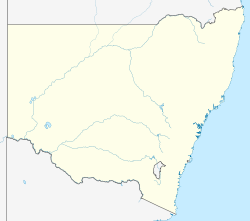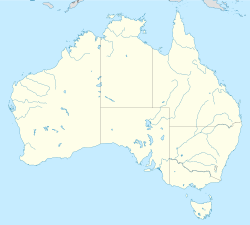This article needs additional citations for verification. (March 2009) |
Campion College Australia is a Roman Catholic tertiary educational liberal arts college located at Austin Woodbury Place, Toongabbie in the western suburbs of Sydney, New South Wales, Australia. Named in honour of Saint Edmund Campion, Campion College offers undergraduate studies in the liberal arts and postgraduate studies in Religious Education. The college welcomed its first intake of students in February 2006.[1] The founding president was bioethicist Father John Fleming, and the first graduation ceremony was held in December 2008.[2]
| Motto | Educare ad Aeternitatem |
|---|---|
Motto in English | Educating for Eternity |
| Type | Liberal arts college |
| Established | 2006 |
Religious affiliation | Roman Catholic Church in Australia |
| Chairman | Rev Deacon Adam Walk |
| President | Dr Paul Morrissey |
| Dean | Dr Stephen McInerney |
| Students | ~160 |
| Undergraduates | ~90 |
| Postgraduates | ~70 |
| Location | 33°47′4″S 150°57′54″E / 33.78444°S 150.96500°E |
| Campus | Suburban: 4.0 hectares (10 acres) |
| Patron | Saint Edmund Campion |
| Newsletter | Campion's Brag |
| Colours | Maroon and gold |
| Website | campion |
 | |
 | |
Courses
editCampion offers a Bachelor of Arts in the Liberal Arts as its sole undergraduate degree. The focus of this course is the development of Western culture. The key disciplines are history, literature, philosophy and theology. The program is structured (loosely) chronologically: with students studying the ancient world in first year, the Middle Ages and Enlightenment in second and finishing with modernity and postmodernity in the third and final year. Students may opt to complete a major in any of the four disciplines. Students are also required to complete two science subjects in their final year. They may also elect to study Latin and Greek above their normal study load, with the ability to graduate with an additional Diploma of Classical Languages upon completing eight languages units concurrently with their Bachelor units. Students who do not wish to study for three years may complete the first year of the Bachelor of Arts program and graduate with a Diploma of Liberal Arts - Foundations of the Western Tradition.
In 2020, Campion launched its first postgraduate course, a Graduate Certificate in Religious Education (Primary). The course serves as professional development for individuals currently working as Religious Education teachers and as a pathway for further learning in theological studies.
Campion College is classed as a Non-Self-Accrediting Institution. Its registration as an institution, and accreditation of courses, are completed through the Tertiary Education Quality and Standards Agency (TEQSA). Accreditation is completed in accordance with the Australian Qualifications Framework. Approval was granted by NSW Department of Education & Training in April 2006 to enrol international students in the Bachelor of Arts. The college is also approved by the Australian Government as a Higher Education provider and as such, eligible students have access to FEE-HELP loans for tuition fees. In 2011, the college had an external quality audit by the Australian Universities Quality Agency (AUQA), with commendations received in relation to the academic and quality culture that have been established.[3]
History
editThe college originated in lay initiatives to create a classical liberal education with Catholic characteristics as an alternative to Australia's secular universities.[4]
In its first year of operation, the college's intake was 16 undergraduate students. Since then, new undergraduate enrolments have averaged 30–40 per year, for a total undergraduate student body of around 90.
Campion College publishes a quarterly newsletter, Campion's Brag. The Campion College Student Association (CCSA) publishes a quarterly magazine called The Sextant.
In 2011, the college established the Centre for the Study of Western Tradition[5] to encourage critical reflection and research on the history, literature, languages, philosophy and theology that characterise Western civilisation and culture, in order to raise the profile of these vital disciplines in Australian tertiary education. The Centre holds conferences and symposia relating to its central research themes.[6]
Campus
editThe college's 4-hectare (10-acre) campus and grounds had been a Marist Fathers seminary which was dedicated to, and at one time held relics of, Saint Peter Chanel. The campus houses a chapel, library, accommodation, lecture and tutorial rooms, kitchens, and student areas. In 2018, the college constructed two new residential houses on-site, providing accommodation for an additional 34 students.[7] In 2020, the college received funding and approval to construct a new academic centre on campus, including a new library, lecture theatres, tutorial rooms and dining hall.[8]
See also
editReferences
edit- ^ "Campion College to open in 2006". AD2000. Vol. 18, no. 7. Umbria Associates Pty Ltd. August 2005. Archived from the original on 16 May 2010. Retrieved 9 July 2010.
- ^ "Campion President reappointed". Melbourne Catholic. Retrieved 12 November 2019.
- ^ "Audit Report: Campion" (PDF). Tertiary Education Quality and Standards Agency. Australian Government. 2011. Archived from the original (PDF) on 24 March 2015. Retrieved 7 January 2014.
- ^ Schmude, Karl (2022). "Campion College Australia: the genesis of a Catholic liberal arts college". Journal of the Australian Catholic Historical Society. 43 (2022): 152–166.
- ^ "Campion College opens Centre for the Study for Western Tradition". Roman Catholic Diocese of Parramatta. Archived from the original on 4 June 2014. Retrieved 6 July 2012.
- ^ Sheridan, Greg (17 December 2016). "Western civilisation in safe hands at small Campion College". The Australian.
- ^ "Campion College, Toongabbie NSW - Reitsma Constructions". www.reitsmaconstructions.com.au. Retrieved 12 November 2019.
- ^ "Government commits $5m towards Campion building expansion". Campion College. 17 December 2020. Retrieved 27 July 2021.



